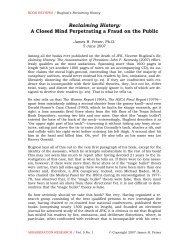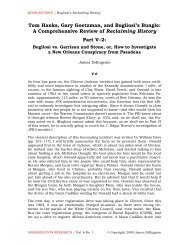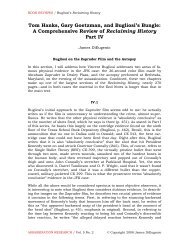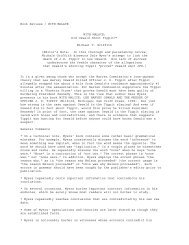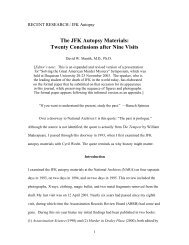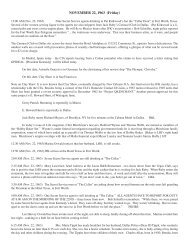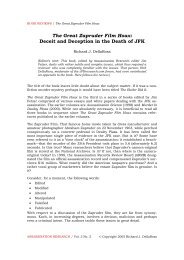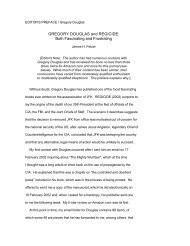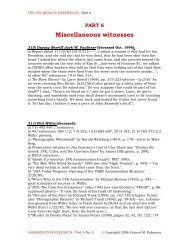A Comprehensive Review of Reclaiming History Part VIII
A Comprehensive Review of Reclaiming History Part VIII
A Comprehensive Review of Reclaiming History Part VIII
You also want an ePaper? Increase the reach of your titles
YUMPU automatically turns print PDFs into web optimized ePapers that Google loves.
James DiEugenio 18 Bugliosi’s Bungle, <strong>Part</strong> <strong>VIII</strong><br />
the infamous I. G. Farben chemical company (ibid., pp. 125–7). This Dulles<br />
client was another huge early contributor to the Nazis. When Sullivan and<br />
Cromwell helped construct Farben’s American alliances, and its subsidiaries,<br />
Farben insisted on secret German control (ibid., p. 136). Through its industrial<br />
might and scope, Farben became a crucial contributor to the war effort. For instance,<br />
in 1943, Farben was responsible for the entire Wehrmacht supply <strong>of</strong><br />
synthetic rubber, methanol, and lubricating oil, plus 95% <strong>of</strong> its poison gas, 84%<br />
<strong>of</strong> German explosives, and 70% <strong>of</strong> German gunpowder (New York Times, October<br />
21, 1945). As Senator Homer Boone said during a Senate hearing on military<br />
affairs on June 4, 1943, “Farben was Hitler and Hitler was Farben.” Allen<br />
Dulles was important to Sullivan and Cromwell in this regard: since he helped<br />
draft parts <strong>of</strong> the Versailles Treaty, he could advise Farben on how to bypass<br />
them, and illegally rearm Germany (Heilbrunn, p. 34). Allen also served as general<br />
counsel for J. Henry Schroder, New York, whose Hamburg banking branch<br />
was a chief backer <strong>of</strong> Heinrich Himmler, commander <strong>of</strong> the SS (ibid.). Allen tried<br />
to fuzz up all this hobnobbing with the Nazis as he socialized with the English<br />
upper classes by saying that the U.S. had no interest in “fights over oppressed<br />
races and lost causes” (ibid.).<br />
In 1940, William Donovan hired Allen to serve in the Office <strong>of</strong> Coordinator <strong>of</strong><br />
Information (COI), which would later turn into the Office <strong>of</strong> Strategic Services<br />
(OSS). Stationed in Berne again, Dulles ran agents all across Europe. He had a<br />
habit <strong>of</strong> playing both sides. For instance, in France he ran money to “DeGaulle’s<br />
Free French guerillas but also to the anti-Gaullist factions <strong>of</strong> his arch-rival,<br />
General Giraud” (Mosley, p. 144). In Germany, he worked with both Nazis and<br />
anti-Nazis. It is here again where some <strong>of</strong> Dulles’s most controversial acts occurred.<br />
The first was the attempted working out <strong>of</strong> a sort <strong>of</strong> “separate peace”<br />
with the SS in northern Italy through General Karl Wolff. This was initiated<br />
without any knowledge by his superiors, and continued like that for weeks.<br />
When Dulles finally reported it, Stalin was enraged: he accused Dulles <strong>of</strong> trying<br />
to arrange a private accommodation with Germany, based, in part, on anti-<br />
Bolshevism. For this reason, the Joint Chiefs told Dulles to terminate the contacts<br />
(ibid., p. 184).<br />
There may be some truth to Stalin’s accusation. When the war ended, Dulles<br />
became OSS chief in Germany. There he got to know two men who would figure<br />
prominently in his efforts to construct the future Central Intelligence Agency:<br />
Richard Helms and Frank Wisner (ibid., p. 226). Wisner told Dulles, “Forget the<br />
Nazis and get in there and find what the Commies are up to instead.” (ibid.,<br />
p. 229) In this regard, Dulles proposed a scheme by which a group <strong>of</strong> anti-Nazi<br />
students would stage a coup in Berlin, take over the city, and then have a force<br />
<strong>of</strong> Anglo-American paratroopers occupy the capital and make it pro-Western—<br />
all before the Russian troops arrived. It was wisely rejected by General Eisenhower:<br />
it may have started World War III; for when the Russians got wind <strong>of</strong> it,<br />
they planned on drenching any American occupying force “by accident” with an<br />
artillery bombardment (ibid., p. 230).<br />
With this dropped, Dulles found a new way to find out what the Soviets were up<br />
to. He heard that General Reinhard Gehlen was hiding in Bavaria. Gehlen was<br />
the commander <strong>of</strong> the Nazi intelligence apparatus for Eastern Europe; he spe-<br />
ASSASSINATION RESEARCH / Vol. 6 No. 1 © Copyright 2009 James DiEugenio



